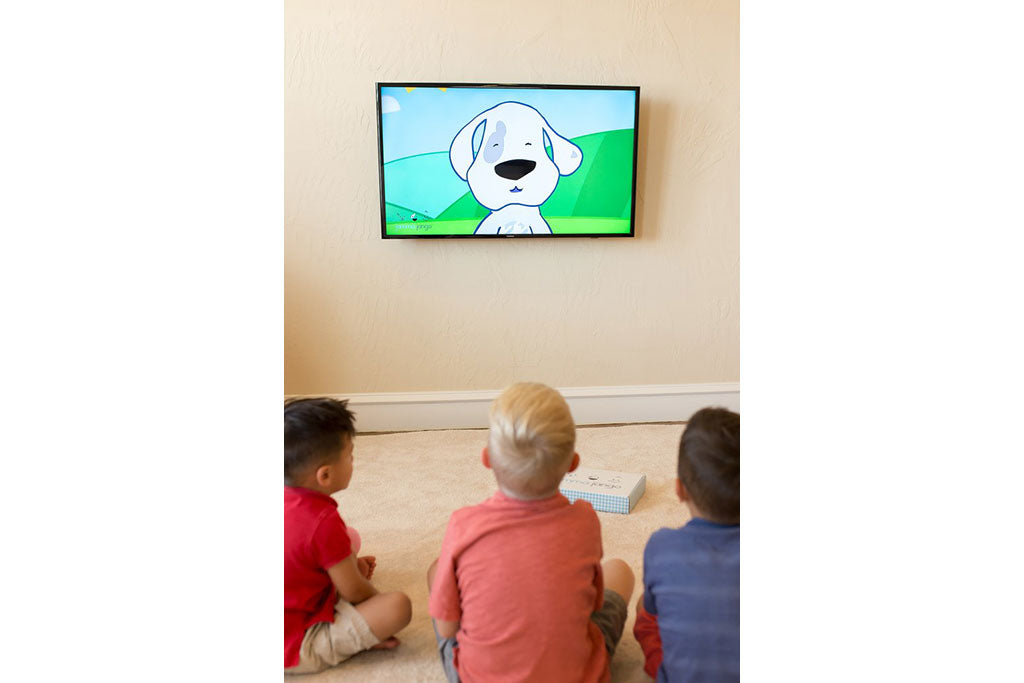It’s often thought that children can become too dependent on the screens around them, such as television, movies, and games. However, we strongly believe in the positive impact that TV and on-screen visuals can help shape the learning of children, which is why we created our language learning product. In this article, originally published by ThoughtCo.com outlines the following reasons why watching television can actually have a positive impact on children:
1. TV can help kids learn about a variety of subjects.
If there’s a subject your child enjoys, more likely than not, there is a TV show, movie, or educational DVD that explores the subject in detail. You might even be surprised to find out how many kids watch and love educational shows aimed at adults. Rachael Ray, for example, has a huge following among kids and tweens, and her primetime show often features kids in the kitchen.
Children’s shows, whether they bill themselves as “educational” or not, may offer opportunities to spark learning. Kids are able to see how fun learning can be and establish a habit of finding out more when things interest them.
Documentary and nature shows are also entertaining and educational for kids. A great example: Meerkat Manor, on the Animal Planet, makes a soap opera out of meerkat life and has kids hooked on the drama.
Most kids are not able to visit the rainforest or see a giraffe in the wild, but many have seen these things on TV. Thankfully, educationally minded producers have given us many shows and movies that allow viewers to see amazing footage of nature, animals, society and other cultures. Kids and adults alike can learn from this type of media and gain a greater appreciation for our world and the animals and other people who inhabit it.
When kids see their favorite characters engaged in fun learning games, they want to play too. Kids also like learning activities more if they involve beloved characters. Preschoolers’ shows are especially effective for generating ideas for learning activities and using characters to motivate kids.
If you have a child who loves Blue’s Clues, for example, you can create clues and a riddle for them to solve at home, or challenge your child to create the riddle and clues. Or, turn a regular activity into a challenge and encourage your child to solve it like the Super Sleuths do.
Of the new movies that are released each year, you can bet that several of them are based on books. Parents can challenge kids to read a book with the promise of going to the theater or renting the movie when they finish it. Or, kids may see a movie and like it so much that they decide to read the book. Discuss the differences between the book and the movie to help kids develop thinking skills.
5. Kids can build analytical skills by discussing media.
Use television programs to prompt discussions about plot and character development. Asking questions as you co-view with your children will help them learn to think, solve problems, and predict, making TV viewing a more active experience. More important than just memorizing facts, developing thinking skills will benefit them for the rest of their lives.
Advertising may be annoying, but it does present yet another opportunity to develop kids’ thinking skills. According to the American Academy of Pediatrics, young children may not even know the difference between programs and commercials. They are just soaking it all in and applying it to their reality. As a parent, you can explain the purpose of advertising to your kids and alert them to any deceptive tactics. Allow them to analyze the methods used by advertisers to sell a product.
Children are influenced by people they see on television, especially other kids. Obviously, this can have a negative result, but it can be positive too. Lately, kids' TV shows have begun promoting some positive agendas such as healthy living and environmental awareness. As kids see their favorite characters making positive choices, they will be influenced in a good way. Parents can also point out positive traits that characters display and thereby spark valuable family discussions.
Media truly can have a positive effect on children, but it is up to the parents, caregivers, and educators in their lives to ensure that kids’ viewing experiences are enriching and not damaging.
Do you believe that children can be positively influenced by watching television?
Let us know your thoughts in the comments section below.


Leave a comment: